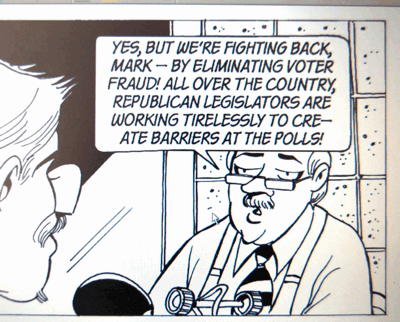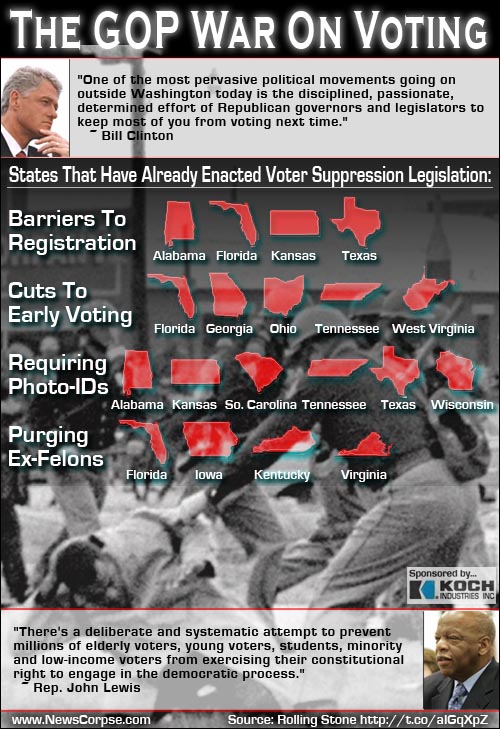G
Guns Guns Guns
Guest
This year’s wave of voter suppression legislation is nothing short of a war on voting, threatening to disenfranchise millions of eligible voters.
These new laws represent a dangerous step backward in the progress made growing voter registration and participation.
Urgent action is needed now to protect every citizen’s right to vote.
Most of the restrictive voting laws have taken the following forms: eliminating election-day registration, restricting third-party voter registration activities, reducing the number of days for early voting and most commonly, requiring photo ID for in-person voting.
But the result is always the same: creating unjust obstacles to voting.
So far this year, 34 states have introduced laws requiring voters to produce photo IDs when voting in person; 12 passed.
According to a study by the Brennan Center for Justice, these new laws will make it harder for more than five million eligible voters to cast ballots in 2012.
Florida’s efforts to suppress voters’ rights may be the most severe.
This year, Florida reduced early voting from two weeks to one week and eliminated voting on the Sunday before Election Day.
Florida also made it prohibitively difficult for people or groups to register voters.
Those who do must register with the state and submit completed registration forms within 48 hours, down from a previous requirement of 10 days.
Florida students and others who move within the state can still update their registration at the polls, but now they will be forced to use provisional ballots, which likely won’t be counted.
Of particular concern to us is the possible disenfranchisement of young people and communities of color. South Carolina, Texas and Tennessee passed strict voter ID laws that expressly exclude photo IDs issued by state universities.
Wisconsin also attempted to exclude student IDs.
Confronted with public resistance, state legislators cynically sidestepped the issue by passing a law with such onerous requirements that no university in Wisconsin issues IDs that qualify.
Excluding the form of ID most likely to be possessed by college students doesn’t make sense and will make it harder for them to vote.
Reducing early voting periods and eliminating Sunday voting clearly targets minority voters.
In 2008, black voters accounted for 13 percent of total turnout, but they made up 22 percent of all early voters and 31 percent of Sunday voters.
In the same year, Latinos were 7.4 percent of all voters, but on the final Sunday before the election, Latinos accounted for 22 percent of voters that day.
There is no consistent or logical basis for this barrage of new laws.
The most cited reason is combating voter fraud, but even when the Bush administration’s Department of Justice focused on rooting it out, there were only 86 voter fraud convictions out of nearly 200 million votes cast, a rate of 0.0000004%, according to a study by People For the American Way.
Mass voter fraud simply does not exist.
While these laws are tackling a fictitious problem, the consequences are very real.
Voter ID laws will make voting more difficult for the millions who currently don’t have acceptable government-issued IDs.
Shorter early voting periods will result in longer lines, which will discourage voters.
Voters of color, who tend to vote at higher rates during early voting times, will be similarly impacted. And unreasonable restrictions on third-party voter registration will dissuade organizations that don’t want to risk the new fines.
These voter suppression laws cannot be allowed to tear down the progress made by the civil rights movement and Voting Rights Act of 1965.
Several of these laws are currently under review by the Department of Justice.
We urge them to use the full weight of the office to push back and reject those that are discriminatory.

http://www.votolatino.org/voting/2011/11/30/restrictive-voting-laws/
These new laws represent a dangerous step backward in the progress made growing voter registration and participation.
Urgent action is needed now to protect every citizen’s right to vote.
Most of the restrictive voting laws have taken the following forms: eliminating election-day registration, restricting third-party voter registration activities, reducing the number of days for early voting and most commonly, requiring photo ID for in-person voting.
But the result is always the same: creating unjust obstacles to voting.
So far this year, 34 states have introduced laws requiring voters to produce photo IDs when voting in person; 12 passed.
According to a study by the Brennan Center for Justice, these new laws will make it harder for more than five million eligible voters to cast ballots in 2012.
Florida’s efforts to suppress voters’ rights may be the most severe.
This year, Florida reduced early voting from two weeks to one week and eliminated voting on the Sunday before Election Day.
Florida also made it prohibitively difficult for people or groups to register voters.
Those who do must register with the state and submit completed registration forms within 48 hours, down from a previous requirement of 10 days.
Florida students and others who move within the state can still update their registration at the polls, but now they will be forced to use provisional ballots, which likely won’t be counted.
Of particular concern to us is the possible disenfranchisement of young people and communities of color. South Carolina, Texas and Tennessee passed strict voter ID laws that expressly exclude photo IDs issued by state universities.
Wisconsin also attempted to exclude student IDs.
Confronted with public resistance, state legislators cynically sidestepped the issue by passing a law with such onerous requirements that no university in Wisconsin issues IDs that qualify.
Excluding the form of ID most likely to be possessed by college students doesn’t make sense and will make it harder for them to vote.
Reducing early voting periods and eliminating Sunday voting clearly targets minority voters.
In 2008, black voters accounted for 13 percent of total turnout, but they made up 22 percent of all early voters and 31 percent of Sunday voters.
In the same year, Latinos were 7.4 percent of all voters, but on the final Sunday before the election, Latinos accounted for 22 percent of voters that day.
There is no consistent or logical basis for this barrage of new laws.
The most cited reason is combating voter fraud, but even when the Bush administration’s Department of Justice focused on rooting it out, there were only 86 voter fraud convictions out of nearly 200 million votes cast, a rate of 0.0000004%, according to a study by People For the American Way.
Mass voter fraud simply does not exist.
While these laws are tackling a fictitious problem, the consequences are very real.
Voter ID laws will make voting more difficult for the millions who currently don’t have acceptable government-issued IDs.
Shorter early voting periods will result in longer lines, which will discourage voters.
Voters of color, who tend to vote at higher rates during early voting times, will be similarly impacted. And unreasonable restrictions on third-party voter registration will dissuade organizations that don’t want to risk the new fines.
These voter suppression laws cannot be allowed to tear down the progress made by the civil rights movement and Voting Rights Act of 1965.
Several of these laws are currently under review by the Department of Justice.
We urge them to use the full weight of the office to push back and reject those that are discriminatory.

http://www.votolatino.org/voting/2011/11/30/restrictive-voting-laws/



